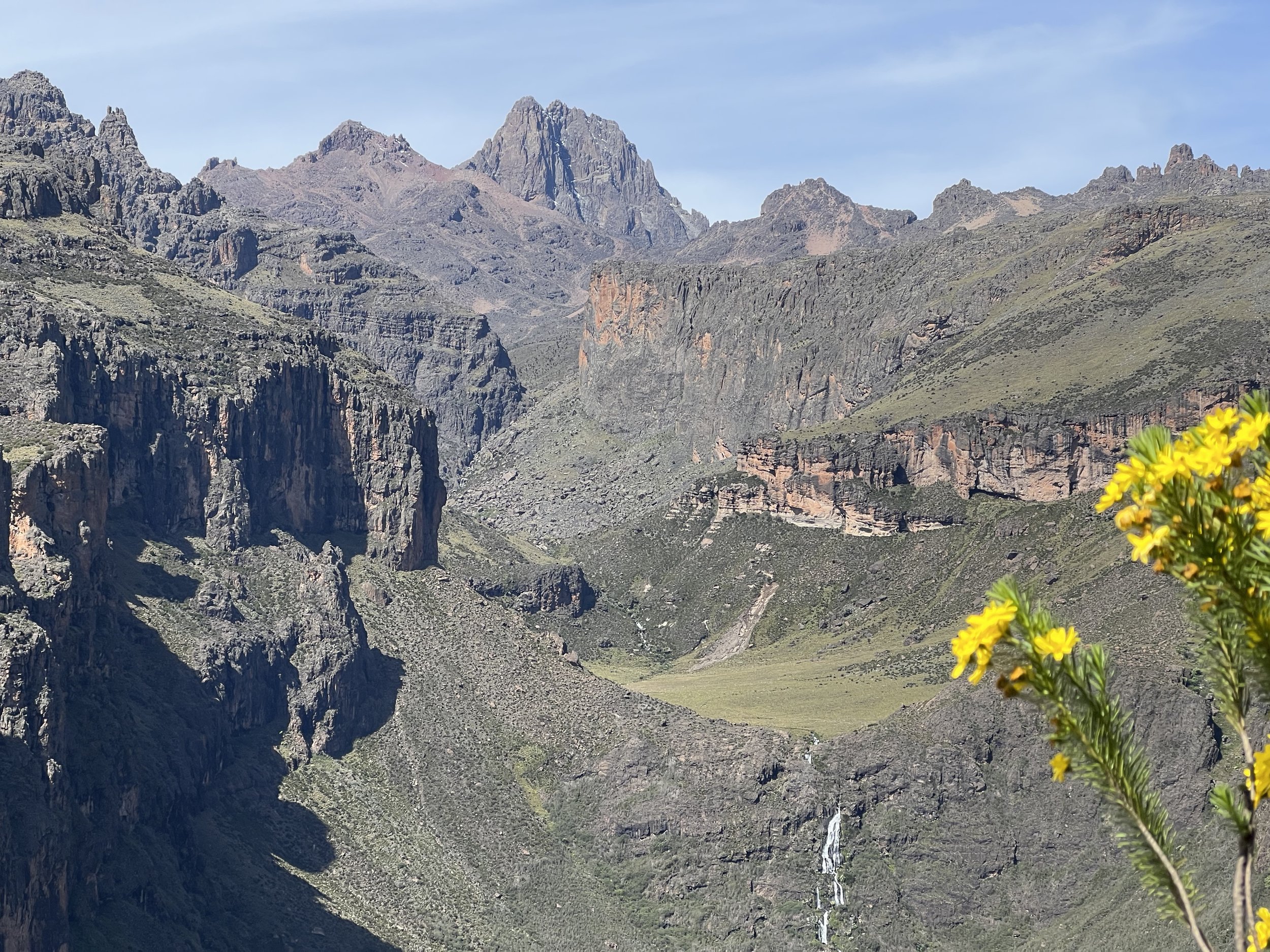
Frequently Asked Questions
What type of support does Peak Point Tours provide?
Peak Point Tours specializes in all-inclusive custom-tailored trips for adventurers of all types. We offer different amounts of support based your specific needs and budget. For many of our clients, we meet them at the airport, and handle every step along the way, including hotel and restaurant reservations, arranging guided tours, and of course being your guide and support for the treks and other outdoor activities that you choose. On treks such as Mt. Kenya this includes your trekking guides themselves, having porters to carry everything but your day pack and camera, cooks who will prepare multi-course meals for breakfast, lunch, and dinner, tents and sleeping pads, arranging all park permits, and transport to and from the trailheads, We can also provide lighter levels of support if this is a better fit for your budget and schedule.
How fit do I need to be to climb Mt. Kenya?
Climbing to Point Lenana requires good general fitness and experience hiking on rugged trails. Depending on the specific agenda, most days will involve several hours of hiking before and after lunch with light day packs. You do not need to be an extreme athlete or experienced mountaineer for our Mt. Kenya treks! If you are an experienced climber and plan to include a technical climb to the summits of Nelion and/or Batian, climbing routes are full-day multi-pitch alpine rock climbs starting at the difficulty of 5.8 / 5a, and require the necessary fitness for this grade as well as skills including belaying, rappelling, and general alpine rock experience.
What is the best time of year to climb Mt. Kenya?
Generally the best seasons to climb Mt. Kenya are between June and October, or December to February.
What route is best?
Each route is incredible in a different way! We will work with you to choose the best route based on the mileage/elevation per day, the scenery, flora, and fauna you are likely to see, and the weather and trail conditions.
How far do I trek each day?
The specific hike each day depends on the agenda and route we choose, however you can expect an average day to include 5 to 10km of hiking and 300-500 meters of elevation gain, with more on summit day. We also can create a trip that allows for a longer acclimatization schedule and lower distances per day, as well as faster ascents for pre-acclimated trekkers who are coming to Mt. Kenya following an ascent of Kilimanjaro.
What type of gear do I need?
We recommend brining a range of clothing and gear due to the zones we will be trekking through and their different elevations, temperature, and weather. This would include:
Sleeping: A sleeping bag rated for -5C or lower, sleeping pad
Footwear: Comfortable warm trekking boots, waterproof if possible, and several changes of wool socks. Sandals optional for around camp
Clothing: Long underwear / base layers for your top and bottom, underwear for a week, softshell hiking pants, 1-2 fleece mid layer tops, 1-2 synthetic tee shirts, a mid-weight puffy jacket, fully waterproof hardshells for both lower and upper body, lightweight and midweight water resistant gloves, sunhat, warm hat, category 3 or 4 sunglasses, buff / neck gaiter
Personal care: toothbrush and toothpaste, small first aid kit, sunscreen
Packs/Bags: A ~30 liter daypack for trekking. A ~90 liter duffle for the porters to use for the rest of your kit. Rain covers for both. Dry bags for anything in your kit that you do not want to get wet (this can include contractor or garbage compactor style garbage bags.)
Personal items: Category 3-4 sunglasses, sunscreen, lip balm, trekking poles, snacks for during your trek, headlamp and batteries, power pack for charging phones, camera, wash kit, dry storage for passport/paperwork, 2 1-liter water bottles, wet wipes, anti-bacterial hand gel
Medicine: We recommend talking to your doctor regarding vaccinations and medicine. Many of our clients bring diamox to help with acute mountain sickness, anti malarial medicine, and antibiotics for gastro-intestinal issues, and arrive vaccinated for yellow fever among other common vaccinations.
Can I rent gear?
Please reach out if you have specific gear rental requirements. Gear can be rented from several vendors and reserved in advance, however supplies may be limited.
What type of food is included?
Our treks include three sit-down multi-course meals a day. Our cooks create a range of meals for us, including local delicacies as well as western-style food you will be familiar with. As we are planning your trip we will discuss your food preferences and requirements, and we can accommodate any dietary restrictions.
What languages are spoken?
Our guides and team speak English and Swahili. We can also arrange to have other local guides join to support languages including French, German, Spanish, among others. Please reach out so we can ensure we can meet these needs.
What does a trip cost?
Trip costs range depending on the length, level of support, team size, and other add ons. Please reach out and we can discuss your goals and we can provide high-level estimates prior to a complete price breakdown.
How much should I tip the support team?
Tipping of guides and other team members is recommended and highly appreciated. We can discuss the specific rates we recommend per team member, which will generally add up to be ~15% of the price of the trek.